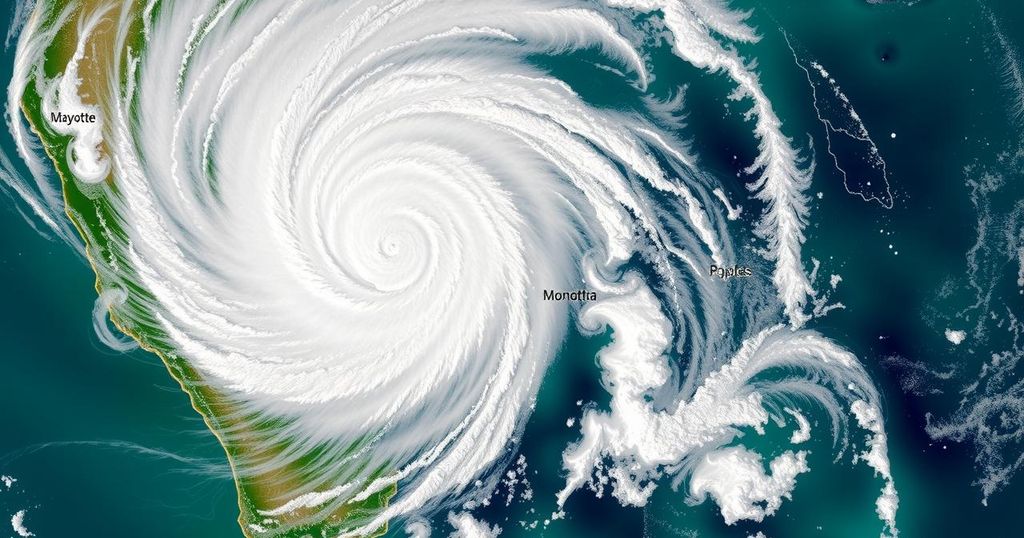World news
AFRICA, BIEUVILLE, CHI, CHIDO, DI, DIEKLEDI, DIKELEDI, EMERGENCY RESPONSE, EUROPE, FLORIANE BEN HASSEN, FRANCE, FRANCOIS -, HURRICANE BERYL, MADAGASCAR, MAYOTTE, MBOUINI, MET, MOZAMBIQUE, MOZAMBIQUE CHANNEL, NATIONAL OFFICE FOR RISK AND DISASTER MANAGEMENT, NATURAL DISASTER, NATURAL DISASTERS, PARIS
Elena Martinez
0 Comments
Tropical Storm Dikeledi Hits Madagascar and Mayotte, Heads Toward Mozambique
Tropical Storm Dikeledi is heading towards Mozambique after causing floods in Mayotte and three fatalities in Madagascar. The storm follows the devastating impact of Cyclone Chido and remains a significant concern as it is expected to intensify. Authorities have issued red alerts in affected regions as heavy rainfall and destructive winds are forecasted, prompting ongoing emergency responses.
Tropical Storm Dikeledi has made its way towards Mozambique after causing significant devastation in Madagascar and flooding in the French territory of Mayotte. After making landfall as a cyclone in Madagascar on Saturday, it resulted in at least three fatalities according to the National Office for Risk and Disaster Management. By the following day, Dikeledi had weakened to a severe tropical storm, passing near Mayotte while a red alert remained in effect.
Francois-Xavier Bieuville, Mayotte’s prefect, stated that the red alert would continue as the area remains susceptible to extreme winds and rainfall. Although there have been no reported casualties from Dikeledi in Mayotte, the territory is still recovering from Cyclone Chido, which was responsible for 39 deaths and injured over 5,600 individuals.
By early Monday morning, Dikeledi was approximately 150 kilometers off the coast of Mozambique and expected to intensify as it traverses the warm waters of the Mozambique Channel. Weather authorities forecast it may develop into a powerful tropical cyclone, prompting warnings for the Nampula region of Mozambique regarding heavy rains and destructive winds. Coastal communities in Mayotte were also cautioned to exercise great caution in anticipation of further rains.
Local emergency services reported substantial damage, including the destruction of homes and widespread flooding. Many residents, still grappling with trauma from previous storms, expressed their disbelief at experiencing another disaster so soon. Current weather patterns indicate that as this region is only at the midpoint of the rainy season, further challenges may lie ahead. Given the existing red alert, Mayotte’s inhabitants have been ordered to remain indoors except for emergency services.
In response to the situation, over 4,000 personnel, including police and military, have been mobilised to assist those affected by the storm. Furthermore, approximately 80 shelters have been set up to accommodate displaced individuals as the region braces for the ongoing impact of Dikeledi.
The region affected by Tropical Storm Dikeledi has been severely impacted in recent weeks due to cyclone activity, highlighting the vulnerability of the area to extreme weather events. Cyclones typically occur in the Indian Ocean from November to March, in conjunction with elevated sea surface temperatures. This year’s conditions have been particularly conducive to storm development, with surface water temperatures nearing 30 degrees Celsius, exacerbated by global warming patterns observed across tropical ocean regions.
In summary, Tropical Storm Dikeledi has posed a significant threat to the already fragile regions of Madagascar and Mayotte, while it moves towards Mozambique. The aftermath of previous cyclones, such as Chido, still lingers, contributing to widespread devastation. The ongoing red alert in Mayotte underscores the urgent need for caution as communities navigate the unpredictable and life-threatening impacts of successive storms as they approach the peak of the rainy season.
Original Source: www.bryantimes.com




Post Comment